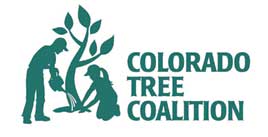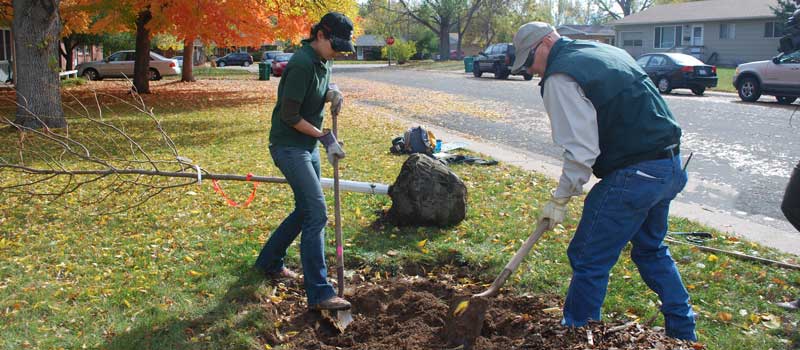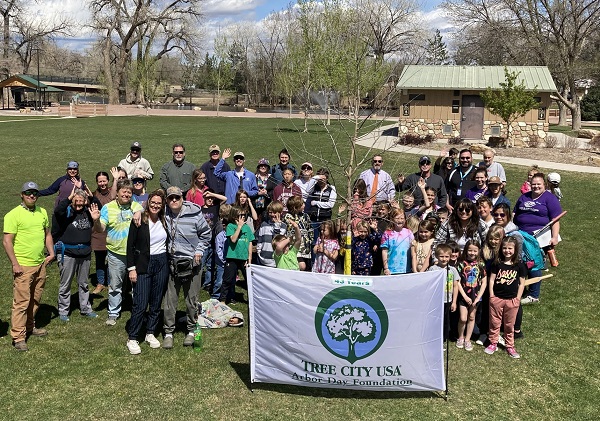Urban & Community Forestry
The Colorado State Forest Service is committed to helping communities manage their trees.

Urban forests are the trees and green spaces in our cities and towns. They are dynamic ecosystems that improve the quality of life for everyone in Colorado. Urban forests provide important benefits, including clean air and water, lower energy costs, wildlife habitat, noise reduction, economic value, shade, places to recreate, and color, structure and beauty in our communities.
Community Forestry Resources
The Colorado State Forest Service offers a variety of programs and resources to help communities in Colorado manage their urban forests.
An inventory of a community’s public trees is often the first step toward effectively managing the urban forest. A tree inventory can be very useful, as it will identify tree species, hazardous trees, pruning needs, insect problems, incidence of disease and open spaces available for tree planting. The inventory is an integral part of any long-range plan to sustain the urban forest.
The CSFS can help communities conduct a tree inventory and provide technical assistance in developing an urban forest management plan. Contact the Urban & Community Forestry Program staff at the bottom of this webpage or your local CSFS field office for information.
 Communities can house and manage their tree data on the Colorado Tree View (CO-TreeView) platform. CO-TreeView is an online, user-friendly tree inventory and mapping tool that records the location, species and condition of the trees that make up Colorado’s urban forests.
Communities can house and manage their tree data on the Colorado Tree View (CO-TreeView) platform. CO-TreeView is an online, user-friendly tree inventory and mapping tool that records the location, species and condition of the trees that make up Colorado’s urban forests.
Funding is available to enhance urban forests in disadvantaged areas of Colorado through the Colorado IRA Urban & Community Forestry grant program, created with Inflation Reduction Act (IRA) funding through the USDA Forest Service. The CSFS has $3.6 million available through the program, which will be offered through three grant cycles over three years starting in 2024. Eligible projects will prioritize capacity building and community engagement to improve forest canopies in disproportionately impacted (DI) areas of Colorado, identified through the Climate and Economic Justice Screening Tool under the federal Justice40 Initiative.
The Colorado Tree Coalition also provides grants to promote community forestry in Colorado.
The CSFS coordinates the following Arbor Day Foundation programs in Colorado:
Tree City USA provides direction, technical assistance, public attention and national recognition for urban and community forestry programs in thousands of towns and cities across America. The benefits of being a Tree City USA include creating a framework for action, education, a positive public image and citizen pride.
Tree Line USA encourages utility companies to employ best practices that safeguard trees. The benefits of being a Tree Line USA include saving time and money, increasing reliability of service and bolstering a positive public image.
Tree Campus Higher Education recognizes college and university campuses that effectively manage their campus trees, develop connectivity with the community beyond campus borders to foster healthy urban forests, and strive to engage their student population through service-learning opportunities centered on campus and community forestry efforts.
Contact the Urban & Community Forestry Program staff at the bottom of this webpage or your local CSFS field office for information on these programs.
The CSFS can help communities plan for and manage diseases and pests that negatively impact urban forests, such as the emerald ash borer. CSFS foresters and urban forestry specialists are also available to help residents and communities assess potentially infested trees.
Contact the Urban & Community Forestry Program staff at the bottom of this webpage or your local CSFS field office for information and support for invasive species. Publications are also available on common diseases and pests that harm trees and urban forests.
 The Colorado Tree Coalition (CTC) is a volunteer, nonprofit organization administered by the CSFS. The mission of the CTC is to lead statewide efforts to preserve, renew and enhance community forests in Colorado. The organization works closely with partners to provide programs and services to communities across Colorado.
The Colorado Tree Coalition (CTC) is a volunteer, nonprofit organization administered by the CSFS. The mission of the CTC is to lead statewide efforts to preserve, renew and enhance community forests in Colorado. The organization works closely with partners to provide programs and services to communities across Colorado.
The CSFS is a proud supporter of the Colorado Urban Wood Network. The Colorado UWN is a chapter of the national Urban Wood Network that shares knowledge and resource among members to fully realize the value of trees within our urban areas, from planting to maturity and eventually as wood products.
Tree Planting and Care

Careful planning is necessary when selecting and planting a tree. It is important to plant the right tree in the right location at the right time of year. The Colorado State Forest Service provides guidance on selecting, planting and caring for trees in our communities.
Colorado Arbor Day
 Arbor Day is a holiday where people plant and celebrate trees. The first Arbor Day was celebrated in Nebraska in 1872 and commemorated with the planting of a million trees. The Colorado State Legislature voted in 1889 to designate Arbor Day a state holiday on the third Friday in April, as described in the Colorado Revised Statutes (C.R.S. 24-11-104).
Arbor Day is a holiday where people plant and celebrate trees. The first Arbor Day was celebrated in Nebraska in 1872 and commemorated with the planting of a million trees. The Colorado State Legislature voted in 1889 to designate Arbor Day a state holiday on the third Friday in April, as described in the Colorado Revised Statutes (C.R.S. 24-11-104).
The Colorado State Forest Service champions Colorado Arbor Day and helps the state recognize National Arbor Day on the last Friday in April.
Visit the Arbor Day Foundation to learn more about the Tree Planters’ Holiday and get ideas for how you can celebrate Arbor Day in your community.
Contact the CSFS Urban & Community Forestry Program
Carrie Tomlinson
UCF Program Manager
Kamie Long
UCF Program Specialist, Western Colorado

